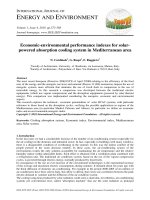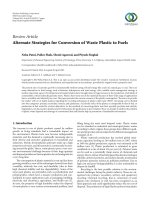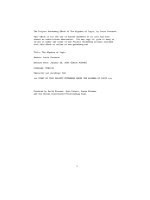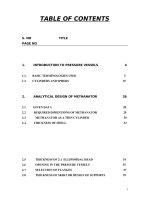The international calibration procedure for B3 film dosimetry system to ensure the quality irradiated products by 10 MeV electron beam accelerators at VINAGAMMA
Bạn đang xem bản rút gọn của tài liệu. Xem và tải ngay bản đầy đủ của tài liệu tại đây (522.61 KB, 6 trang )
Nuclear Science and Technology, Vol.7, No. 2 (2017), pp. 38-43
The international calibration procedure for B3 film dosimetry
system to ensure the quality irradiated products by 10 MeV
electron beam accelerators at VINAGAMMA
Nguyen Thi Ly, Nguyen Thanh Duoc, Doan Binh, Cao Van Chung,
Doan Thi The, Pham Thi Thu Hong*
Research and Development Center for Radiation Technology,
202A street 11, Linh Xuan ward, Thu Duc district, HCM. City, Vietnam
*Email:
(Received 07 August 2017, accepted 24 November 2017)
Abstract: We performed an in-plant calibration of dosimetry system by electron beam (EB)
irradiating the B3 film dosimeters at VINAGAMMA, and inter-compared with the alanine dosimetry,
which were supplied and analyzed by Risø High Dose Reference Laboratory (HDRL) as the reference
standard. The results revealed that the relative deviation between the values of absorbed doses
obtained with our dosimeter and the transfer standards dosimeter measured by HDRL was within the
acceptable limitation (about ± 3.0 % in the target range of 2.0-10.0 kGy). And post-irradiation stability
of B3 film dosimeters was still maintained after 180 days storage. It is suggested that the B3 film
dosimetry could be used in routine radiation processing at VINAGAMMA with the investigated dose
range for quality assurance of the irradiated products, specially are foods and foodstuffs processed
under the 10 MeV EB accelerator at VINAGAMMA.
Keywords: B3 dosimeter, in-plant calibration, alanine reference dosimeter, electron beam radiation.
Calibration and measurement of
radiation doses are one of the most important
steps in the good irradiation practices to ensure
the quality of irradiation process [1,2].
– 140 kGy. On the other hand, energy
absorption of B3 film from EB irradiation is
similar to water, the B3 dosimeter becomes an
excellent candidate for measuring the doses at
material/material and air/material interfaces
[3,4,5].
B3 dosimeter is a radiochromic film
consisted of polyvinyl butyral (PVB) resin
mixed
with
the
radiochromic
dye
(pararosaniline) are increasingly used as a
routine dosimeter to measure the absorbed
doses in irradiation on practices for both
gamma and EB facilities due to its small in size
and simple requirements for its dosemearsuring equipment. Briefly, absorbed dose
is determined based on the color change when
the film was exposed to ionizing radiation.
This dosimeter was stable and has been applied
to measure the absorbed doses in the range of 1
With the increasing of irradiation facility
(gamma or electron beams) for multi-purpose
irradiation processing, many dosimeters and
dosimetry systems have been developed for
measuring absorbed dose. And the calibration
becomes an essential and important procedure
to control the quality of irradiation process.
This paper reported an in-plant calibration for
B3 film dosimeters which used for EB
irradiation at VINAGAMMA, intercompared
with alanine dosimeter from Risø High Dose
Reference Laboratory (HDRL, Danmark) as
reference standard dosimetry.
I. INTRODUCTION
©2017 Vietnam Atomic Energy Society and Vietnam Atomic Energy Institute
PHAM THI THU HONG et al.
EB irradiations were carried out under the
10MeV accelerator (UERL-10-15S2 linac,
CORAD Ltd., Russia) equipped by a conveyor
system with beam scanning width of 60 cm and
average pulse current of 0.25A. The conveyor
speed, scanning frequency, sync frequency of
accelerator were controlled to ensure the
uniformity of absorbed dose. The phantom was
placed parallel on the conveyor, perpendicular to
electron beams and irradiation, as shown in Fig.1b.
II. EXPERIMENTAL
Materials and equipment
• Routine dosimeter system: B3 film
(GEX Corp., USA; Product: B3000; Batch:
CB; Average thickness: 0.0177mm)
• Reference
standard
dosimeters:
Alanine pellets, 4 pellets per dosimeter (Risø
High Dose Reference Laboratory)
• Electron beam facility: UERL-1015S2, 10 MeV, 15 kW, supplied by CORAD
Ltd., Co., Russia;
Four of B3 film dosimeters and four
alanine pellets were used for each dose point.
For each dose point, start and maximum
temperature were recorded during the
irradiation. The calibration irradiations were
carried out by placing one pack of alanine
reference standard dosimeters (containing four
pellets) and four B3 film dosimeters (in one
sachet) into polystyrene phantom supplied by
HDRL of Risø National Laboratory. The
phantom was put into carton tray, normally
used to carry the product boxes, as shown in
Fig.2a and 2b, and irradiated at doses of 2.0;
3.5; 5.0; 7.5; 10 kGy, respectively
• Genesys 20 spectrophotometer, GEX
Corp., USA
• EB calibration phantom (Risø High
Dose Reference Laboratory).
Irradiation
of
dosimeters
calibration of the dosimetry
and
The routine (B3 film) and reference
transfer standard (alanine pellets) dosimeters
are placed into an EB phantom and
simultaneously irradiated by a 10MeV UERL10-15S2 linac accelerator at 5 points of doses
from 2 to 10 kGy as shown in Fig.1a [1,2,6].
After irradiation, the alanine dosimeters
were sent back to Risø High Dose Reference
Laboratory, Danmark for analysis. The
absorbed doses obtained. The absorbed doses
with the B3 dosimeters were also measured by
using Genesys 20 spectrophotometer at the
wavelength of 552 nm (ISO/ASTM 51310 and
Guidelines for the measuring GEX dosimeters
100-258 D) [7,8].
In-plant calibration of the B3 film
dosimeters was performed by irradiating them
together with reference standard dosimeters to
minimize the contribution of influence
quantities, to the overall uncertainty and to
ensure the same irradiation conditions for both
reference and routine dosimeters during the
production run.
(a)
(b
)
B3 films
alanine
Fig.1. A phantom used for irradiation of alanine pellets and B3 dosimeters (a) and irradiation of the phantom
by 10 MeV EB, VINAGAMMA (b).
39
THE INTERNATIONAL CALIBRATION PROCEDURE FOR B3 FILM DOSIMETRY SYSTEM …
Measurement uncertainty and calibration
curve
III. RESULTS AND DISCUSSION
Intercomparison calibration of
dosimetry
Components of uncertainty were
identified by statistical method using the Excel
software. The combined uncertainty of an
absorbance value and an absorbed dose of the
dosimeter system were evaluated within 5 %
at a 95 % for confidence level [9].
As shown in Figure 2, color of the B3
films was changed from white to pink after
irradiation with a 10 MeV electron beams.
These changes were also confirmed by UV
spectra. These spectrum show a major
absorption peak at the wavelength around 550 552 nm, which was increased in proportion to
the electron affluence. Because of the broad
peak of the B3 film, measurement at any fixed
wavelength between 550 – 555 nm is
considered acceptable, as recommended by
GEX [1,2,3].
Finally, the calibration curve was plotted
as function of R=f (Dose),
Where
R = Response = Ai/T, with
Ai = irradiated absorbance and
T = Thickness of B3 film
Dose = Alanine reference standard dose (kGy).
10 kGy
0.4
7.5 kGy
0.35
5.0 kGy
B3 film
10 kGy
7.5 kGy
5.0 kGy
3.5 kGy
2.0 kGy
0 kGy
Abs 0.3
3.5 kGy
0.25
2.0 kGy
0.2
400
0 kGy
500
600
Wavelength [nm]
700
Fig.2. Photo (Left) and absorption spectra (Right) of B3 films irradiated from 0 to 10 kGy.
Table I. Dose intercomparison using B3 film and HDRL alanine reference standard dosimeters irradiated by
10 MeV EB at VINAGAMMA
No.
Target
dose, kGy
B3 film
measured
dose, kGy
Code of
alanine
dosimeters
Alanine
measured
dose*, kGy
Ratio
B3 film/Alanine
1
2.0
2.37
1043
2.44
0.970
2
3.5
3.82
1048
3.92
0.974
3
5.0
5.39
1049
5.66
0.952
4
7.5
7.87
1050
8.15
0.966
5
10.0
11.05
1047
11.22
0.987
Overall mean
0.970
*Reference dosimeter certificate no: 16C-32, reported by HDRL of Risø National Laboratory
**CV: coefficients of variation. Irradiation date: 14 May 2016.
40
CV**
- 3.0 %
PHAM THI THU HONG et al.
12.0
10.0
B3 dose = 0.970 . Alanine dose
Corr. Coeff. = 0.999
B3 dose, kGy
8.0
6.0
4.0
2.0
0.0
0.0
2.0
4.0 6.0 8.0 10.0 12.0
Alanine dose, kGy
Fig.3. Comparison of doses measured by B3 film and HDRL alanine reference standard dosimeters irradiated
at VINAGAMMA EB facility.
As one can see from Table.I and Fig.3,
the relative deviation of absorbed dose
values quoted by VINAGAMMA to dose
values estimated at HDRL are in good
agreement of within about ± 3.0 % at the
absorbed dose range of 2.44-11.22 kGy
[1,3]. The dose–response between the
alanine and B3 film dosimeters were studied
for the dose range between 2 and 10 kGy
Response (Abs/t)
14
12
when exposed to electron beams. The
dependence of the response on doses given
in the 10 MeV EB accelerators is described
in Fig.4. The linear regression coefficient is
better than 0.9999. No statistically
significant difference was observed between
the two sets of data in the absorbed dose
range of 2.44-.22 kGy.
Response = 0.7095 Dose + 2.2255
R² = 0.9999
10
8
6
4
2
0
0
2
4
6
8
10
12
14
Dose (kGy)
Fig. 4. Calibration curve of the B3 film dosimeter irradiated together with alanine reference standard
dosimeter at VINAGAMMA EB facility.
irradiated during the production run. The
stability of the B3 film dosimeters (irradiated
to 5 kGy) was studied by measuring it 5 times
in 180 days storage. The absorbed dose
Post irradiation stability of B3 film dosimeters
To test the post-irradiation stability of
the B3 dosimeters, dosimetry packages,
containing five B3 film dosimeters were
41
THE INTERNATIONAL CALIBRATION PROCEDURE FOR B3 FILM DOSIMETRY SYSTEM …
results measured by the B3 dosimeters in the
different storage time were shown in Fig.5.
The standard deviation of these 5 results was
found to be 2.52 % at 95 % confidence level. It
indicated that the post-irradiation stability of
B3 film dosimeters was still maintained after
180 days storage.
Fig.5. Stability of the B3 film dosimeters stored in dark at room temperature during storage time.
IV. CONLUSIONS
ACKNOWLEGEMENTS
In the dose range of 2.44 -11.22 kGy, the
B3 film dosimeter was applicable in practice of
EB radiation processing, which has been
calibrated with alanine reference standard
dosimeter by HDRL of Risø National
Laboratory at an acceptable deviation. The
absorbed dose measured with B3 film
dosimeter was in good agreement with that
measured by alanine reference standard
dosimeter within ± 3.0 % (in the acceptable
limitation). The overall uncertainty was 2.52 %
at 95 % confidence level at an absorbed dose
of 4.54 kGy on 10 MeV, 15 kW electron beam
accelerators. The results of this work indicated
that the B3 dosimeter can be utilized as a
routine dosimeter system for quality assurance
of goods by electron beams at VINAGAMMA.
However, to ensure the quality of irradiated
products, the calibration process should be
performed periodically.
This work was a part of RC No. 18984
funded by IAEA. The authors would like to
thanks VINAGAMMA Center for helping in
electron beam irradiation.
REFERENCES
[1] ASTM International (2nd edition), “Standard
practice for calibration of routine dosimetry
systems for radiation processing”, Standards on
Dosimetry for Radiation Processing, 23-41,
2004.
[2] P. Sharpe and A. Miller, “NPL CIRM Report 29
- Guidelines for the calibration of dosimeters
for use in radiation processing”, National
Physical Laboratory, UK, 2009.
[3] GEX Corporation USA, “B3 radiochromic film
dosimetry”, 2010.
[4] M. Bazioglou and J. Kalef-Ezra, “Dosimetry
with radiochromic films: a document scanner
technique, neutron response, applications”,
42
PHAM THI THU HONG et al.
Applied Radiation and Isotopes, 55, 339–345,
2001.
dosimetry system”, Standards on Dosimetry for
Radiation Processing, 43-47, 2004.
[5] C. G. Soares. “Radiochromic film dosimetry”,
Radiation Measurements 41, S100–S116, 2007.
[8] GEX Corporation USA, “GEX GEX DOC #
100-258 D - Guidelines for the measuring GEX
dosimeters”, 2007.
[6] GEX Corporation USA, “GEX DOC # 100 –
263 C - Performing a dosimeter batch
calibration”, 2007.
[9] ASTM International (2nd edition), “Guide for
estimation of measurement uncertainty in
dosimetry for radiation processing”, Standards
on Dosimetry for Radiation Processing, 173193, 2004.
[7] ASTM International (2nd edition), “Standard
practice for use of a radiochromic film
43









